Related Research Articles

Meher Baba was an Indian spiritual master who claimed he was an Avatar — God in human form.

Meherabad was originally an ashram established by Meher Baba near Arangaon village, India in 1923 about 9 kilometres (6 mi) south of Ahmednagar. It is now the site of Meher Baba's samadhi (shrine/tomb) as well as facilities and accommodations for pilgrims. Many buildings mostly associated with the earlier decades of Baba’s work, the graves of disciples, and a range of pilgrim accommodation and charitable establishments are also there. Many Baba-lovers work or live in the vicinity. There is also a free dispensary and school.
Satguru, or sadguru, means the true guru in Sanskrit. However, the term is distinguished from other forms of gurus, such as musical instructors, scriptural teachers, parents, and so on. The satguru is a title given specifically only to an enlightened rishi or saint whose life's purpose is to guide the initiated shishya on the spiritual path, the summation of which is the realization of the Self through realization of God.
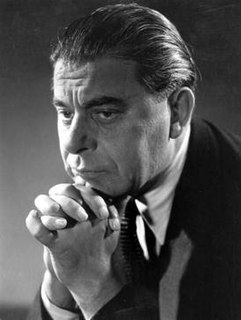
Gabriel Pascal was a Hungarian-born film producer and director whose best-known films were made in the United Kingdom.
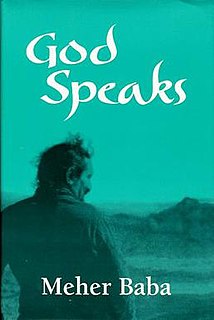
God Speaks: The Theme of Creation and Its Purpose (ISBN 978-0-915828-02-9) is the principal book by Meher Baba, and the most significant religious text used by his followers. It covers Meher Baba's view of the process of Creation and its purpose and has been in print continuously since 1955.
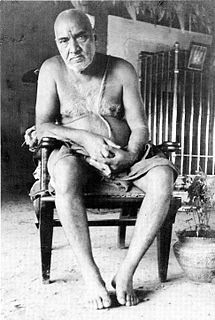
Upasni Maharaj, born Kashinath Govindrao Upasni, was considered by his disciples to be a satguru. He lived in Sakori, British India, and is said to have received God-realization from Sai Baba of Shirdi. Sakori is located in Ahmednagar District of Maharashtra, about 5 kilometres (3 mi) from Shirdi.

Hazrat Babajan was a Pashtun Muslim saint considered by her followers to be a sadguru or qutub. Born in Balochistan, Afghanistan, she lived the final 25 years of her life in Pune, India. She is most notable as the original master of Meher Baba, an Irani Indian spiritual master.

God in a Pill? Meher Baba on L.S.D. and The High Roads was a 1966 pamphlet containing messages from Meher Baba speaking out against taking drugs such as marijuana and LSD, ultimately saying they were harmful "physically, mentally, and spiritually."
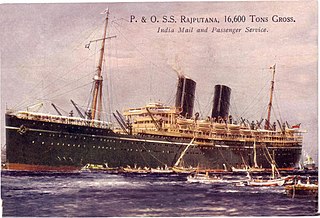
SS Rajputana was a British passenger and cargo carrying ocean liner. She was built for the Peninsular & Oriental Steam Navigation Company at the Harland and Wolff shipyard at Greenock on the lower River Clyde, Scotland in 1925. She was one of the P&O R-class liners from 1925 that had much of their interiors designed by Lord Inchcape's daughter Elsie Mackay. Named after the Rajputana region of western India, she sailed on a regular route between England and British India.

Garrett Elsden Fort was an American short story writer, playwright, and Hollywood screenwriter. He was also a close follower of Meher Baba.

Princess Norina Matchabelli was co-founder of the perfume company Prince Matchabelli, a stage and screen actress, publisher, and a disciple of Indian spiritual teacher Meher Baba. Her stage name was Maria Carmi.

Tukadoji Maharaj was a spiritual saint from Maharashtra, India. He was born in 1909 in a poor family in the village of Yavali in Amravati District of Maharashtra. He was a disciple of Aadkoji Maharaj. Tukdoji Maharaj was involved in social reforms in the rural regions of Maharashtra, including construction of roads. He wrote Gramgeeta which describes means for village development. Many of the development programs started by him have continued to work efficiently after his death. He was once even claimed as a mad by one of the British officers.
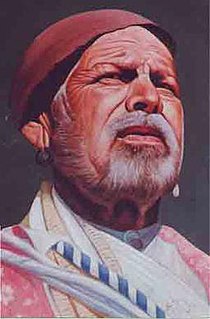
Gadge Maharaj was a mendicant-saint and social reformer from the Indian state of Maharashtra. He lived in voluntary poverty and wandered to different villages promoting social justice and initiating reforms, especially related to sanitation. He is still revered by the common people in India and remains a source of inspiration for various political parties and non-government organizations.

Roland Meredith Starr was a British occultist and poet. He is credited with introducing Meher Baba to the West.
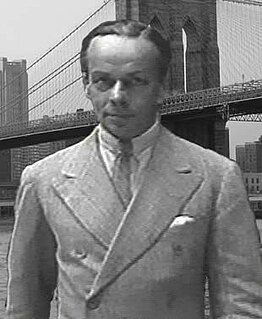
Quentin Tod, sometimes credited as Quentin Todd, was a British actor, dancer, choreographer, television pioneer, and a devotee of Meher Baba.
Perfect Master is the English term Meher Baba began to use in his writing as early as 1925 to denote the Eastern idea of a sadguru (Vedanta) or a qutub (Sufism). A Perfect Master, according to Baba, is a God-realized person who can use his Divine attributes of Infinite Power, Knowledge and Bliss for the spiritual upliftment of others. In describing Meher Baba's specialized use of the term Charles Purdom writes, "The title ‘Perfect Master’. .. means one who has himself reached the goal to which he directs others: one who, pointing to God, has himself realized God."
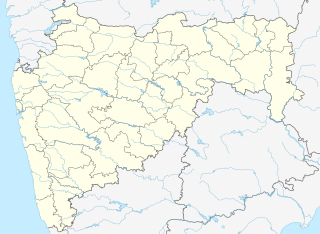
Sakori or Sakuri is a small village in the Ahmednagar district of Maharashtra State, India, about 5 kilometres (3 mi) south of Shirdi. Sakori is best known as the home of Hindu guru Upasni Maharaj and of his ashram, Kanya Kumari Sthan. It is located at 19°43′32″N74°28′41.18″E.

Thomas Augustus Watson was an assistant to Alexander Graham Bell, notably in the invention of the telephone in 1876.

Syed Mohammad Baba Tajuddin also known as Tajuddin Baba is an Indian Sufi Master that many believe to be the last Mujaddid (Qutub). His Holiness' shrine is in Nagpur, India.
References
- ↑ Sacred Sanskrit Words: For Yoga, Chant, And Meditation, by Leza Lowitz and Reema Datta, Stonebridge Press, Berkeley, Ca. 2005, p. 123 ISBN 1-880656-87-6
- ↑ Baba Words; The Master's Glossary, by Frank Davis (under the term "Circle")
- ↑ Meher Prabhu: Lord Meher, The Biography of the Avatar of the Age, Meher Baba, by Bhau Kalchuri, Manifestation, Inc. 1986. p. 4753
- ↑ Meher Prabhu: Lord Meher, The Biography of the Avatar of the Age, Meher Baba, by Bhau Kalchuri, Manifestation, Inc. 1986. p. 4277
